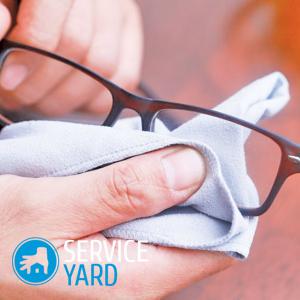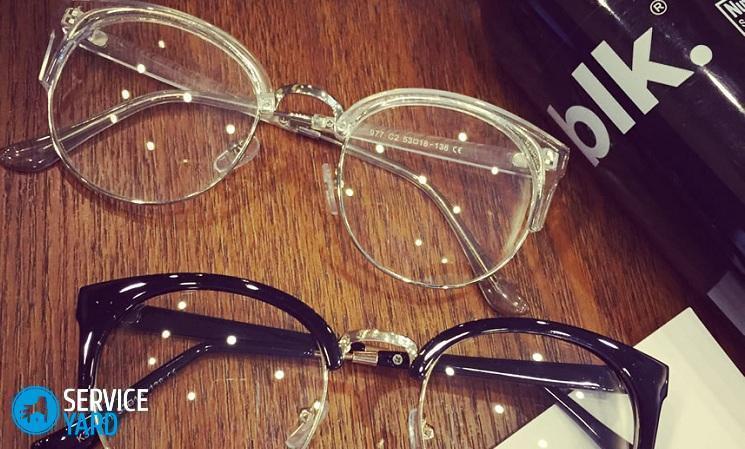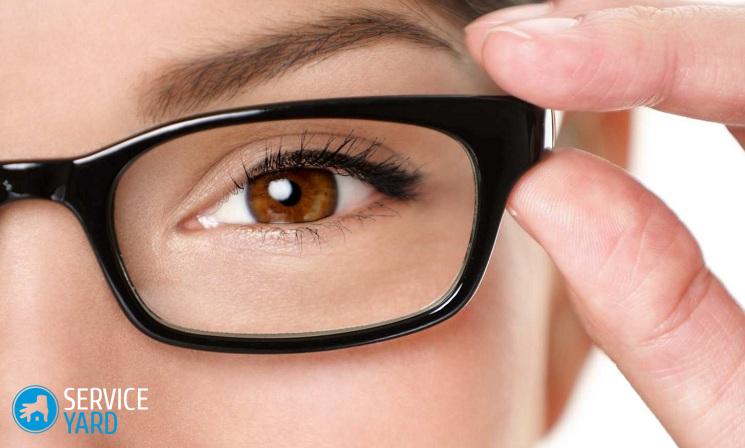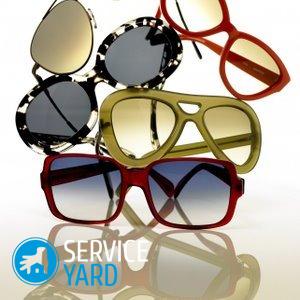How to clean glasses glasses at home?

Statistics say that about a quarter of the world's population wears glasses. This means that almost two billion people face the problem of how to clean and wash glasses at home every day. At the same time, there are not so many ways to clean the glasses. They will be discussed in our article.
to contents ↑What kind of glass do you have?
Before you clean the glasses, it is very useful to figure out what exactly they are made of:
- from glass;
- from plastic;
- made of plastic with anti-reflective coating.
Glass
Glasses have been around for centuries. Their advantages are well known:
- strength;
- hardness;
- the possibility of use in complex pathologies of the organs of vision.
Important! Glass lenses last longer than plastic ones - unless, of course, vision has not changed. To scratch such glasses, you need to try very hard or for many weeks to look after them incorrectly (for example, wipe with a hard cloth every day).
Everyone who has ever worn them also knows about the shortcomings of such models:
- quite a lot of weight;
- fragility;
- the need for tight alignment;
- not very attractive appearance;
- glasses with large diopters do not always stay in a metal frame.
Important! Glass lenses weigh, especially with large diopters, pretty much much more than the same plastic ones. This is due to the fact that glasses of strictly defined thickness are used for vision correction, while in the manufacture of plastic glasses, the desired angle of curvature is achieved in completely different ways.
In addition, with incorrect alignment of the lenses, a person feels very strong discomfort - in contrast, again, from plastic glasses, which do not have such a flaw. In fact, “bespectacles” would have long abandoned glass lenses, but for some diseases another way of correction does not yet exist.
Important! Despite the fact that the optical glass is a fairly strong material and is not equally sensitive to all mechanical influences, it transfers shock and crushing quite poorly, so you need to handle these glasses carefully and correctly.
Plastic
Perhaps these are the most popular glasses, which those who walked in glass for many decades are worn with pleasure. Their advantages are obvious:
- plastic lenses are much lighter and thinner than glass;
- no rigid alignment is required;
- glasses are much cheaper;
- lenses adhere equally well in both metal and plastic frames.
Important! But these glasses have one very significant drawback - the lenses are very easy to scratch, because they are made of soft plastic.
As for plastic glasses with an anti-reflective protective coating, their advantages and disadvantages are the same as those of simple plastic glasses, but more careful care is needed.
to contents ↑How to clean glasses?
Lens care products are entirely dependent on the material of the glass. You can apply:
- Sprays
- special fluids;
- microfiber cloths;
- suede wipes;
- wet wipes;
- soap;
- dishwashing liquid;
- shampoo.
When to wipe glasses?
Finger stains, street dust, splashes, skin flakes, opacities, traces of white plaque, cream residues, mascara droplets - this is not a complete list of what may appear on the lenses. The result and the need to clean the glasses glasses at home, you will feel pretty quickly:
- glasses lose transparency;
- in especially severe cases, objects appear fuzzy;
- the contours of objects are blurred and have a rainbow rim;
- spots appear in front of my eyes with strange outlines.
In all these cases, dirt should be dealt with immediately. The point is not only that the stained glass looks ugly and poorly visible through them. If you systematically look through lenses with spots, you risk, to all other troubles with your eyes, to get strabismus as well.
In addition, glasses need daily care, regardless of whether there is visible dirt on them or not. It is better to spend it in the evening when there is a certain amount of free time and there is no need to rush anywhere. Do you have hygiene before bed? So why not complement the daily complex with another action?
to contents ↑Important! Other situations are possible - for example, when you go into a warm room from the cold. The lenses fog up (with glass this happens more often than with plastic) and nothing is visible through them. After some time, the fog will disappear, the glass will become transparent again, however, there is not always time to wait, it is much easier to wipe.
Professional Tools
The best option to clean the glasses at home is products designed specifically for optical devices. Special sprays and liquids are sold in good optics stores and pharmacies.
Important! They can be for glass and plastic lenses, which you need to ask the seller. The fact is that there will not be any harm to the glass from the product intended for plastics (it’s good, however), but plastic spray can damage the glass, therefore it is not recommended to clean and wash it.
Buying sprays and liquids for glasses is best in specialized stores. There are a lot of fakes on sale, which include substances that can not be wiped with lenses (for example, abrasives and alcohols).
How to apply?
As a rule, such products are available in special packaging, which allows them to be applied to glass in small doses. The tip resembles a dropper with a blunt tip. In addition to the spray itself, you will also need a soft microfiber cloth (for glass lenses suede is also suitable, which you can buy at the same pharmacy or optical store).
Mode of application:
- Wash and dry your hands.
- Apply a drop of spray or liquid to each glass.
- Spread the product evenly over the entire surface.
- Dry your glasses dry with a soft cloth.
Such products perfectly cope with all types of pollution that can only appear on glasses. At the same time, strong pressure and sudden movements should be avoided. Rough handling can damage both plastic and glass lenses.
to contents ↑Important! In winter, a spray or a liquid that prevents fogging of glasses can be very useful.
Soft napkins
If you are looking for something to clean the glasses for your vision glasses, pay special attention to wipes. Microfiber is one of the most popular materials for the manufacture of items for cleaning and personal hygiene. They make a lot of it - rags for floors, napkins for a table or windows.
People with glasses also managed to appreciate its unique properties:
- soft;
- does not scratch the surface;
- excellently removes dust;
- easily copes with particles of fat and skin flakes.
Such a napkin is suitable for both plastic and glass glasses. In order to remove stains, crush with your fingers or scrape is not required, a miracle napkin will perfectly do everything without it.
Despite the victorious march of microfiber, you can still find suede wipes on sale.They are almost inferior to microfiber ones - a little thicker and take up a little more space in the case. Is it possible to wash a napkin for glasses? Usually this is not required, but if necessary, nothing will hinder it.
to contents ↑Wet wipes
Wet disposable wipes are an extremely convenient personal care product. Including, and for the care of glasses. On sale you can find packages of soft napkins soaked in special solutions for a variety of purposes. It is best to look for those recommended for glass. In a hypermarket or hardware store, these may not be, but in the optics store you will certainly be advised of suitable ones. But in general, any wet wipes are suitable for glasses care.
to contents ↑Important! In addition to the fact that such wipes perfectly remove any dirt, they also prevent the growth of bacteria, as they are saturated with an antibacterial composition.
How to clean glasses with plastic glasses without spray and microfiber?
And what if the spray is over, and the fact that you need to buy wet wipes flew out of my head? Nothing bad happened. You probably have some funds at home:
- soap;
- shampoo;
- dishwashing liquid.
Option 1
Any toilet soap is suitable for this method - liquid soap is best, of course, but if it is not, you can take any:
- Start the procedure by washing your hands with the same soap.
- Moisten glasses under the tap with glasses on both sides - it is better if the water is warm, but not hot.
- Moisten your thumb and forefinger.
- Lather them.
- With light movements of these fingers, wash the glass.
- Rinse it off with water.
- Put your glasses on a paper towel or napkin so that the glasses are upright.
- Let them dry.
Important! Sometimes there is no time to wait for the glasses to dry, but you also cannot wipe them with the first cloth or paper that comes across. The only option is to gently get wet with a paper towel, but never rub it. This procedure cannot be repeated often.
Option 2
For this method, shampoo or dishwashing detergent is suitable. The main thing is that they do not have aggressive components. You also need a container in which you can completely immerse the glasses:
- Fill the vessel with water.
- Add a few drops of detergent.
- Immerse the glasses in the solution.
- Take out the glasses.
- Wash off the soapy solution with running water.
- Blot the lenses with a soft cloth.
- Put the glasses on a paper towel so that the glasses stand upright and allow to dry.
Rinse under running water
If there are no visible spots on the glasses, you can do without shampoos. You need:
- tap with warm water;
- soft napkin.
The procedure itself is extremely simple and accessible to literally everyone.
- Open the water - the stream should not be very strong.
- Hold the glasses under it for about half a minute.
- Wipe the glass with a soft cloth.
- Put the glasses on a towel so that they are completely dry.
to contents ↑Important! Whatever you wipe the lenses with, you need to do this from side to side, and not in circular motions.
We remove dirt from cracks
The design of the glasses is such that in their different parts there are many hollows and sockets where dirt is clogged with great pleasure. It must be periodically disposed of. For this you need cotton buds or toothpicks.
Then we act in order to clean the points:
- Remove dirt from crevices.
- Rinse your glasses the way you usually do.
- Dry them.
to contents ↑Important! This procedure needs to be done a couple of times a month.
What should not be used?
There are always lots of things in the house that seem to be suitable for the care of glasses, but they should not be used. These items include:
- shreds;
- handkerchiefs;
- clothes;
- ammonia:
- just alcohol;
- vinegar,
- liquid for washing glasses and mirrors.
Rags and shreds
Why should not you use, for example, the remnants of an old T-shirt? The fabric is so soft! In fact, it only seems soft and causes microcracks, especially on plastic.Glass lenses without any coating can sometimes be wiped with soft tissues, if there is no other way out, but you should not do this all the time, because such wiping will harm your glasses.
Important! As for the edges of clothes, this habit is even more dangerous. Not only is it ugly when a person suddenly, for no reason, raises the hem and begins to wipe something. The edge of the garment is usually made coarser, so that the likelihood of microcracks on the lenses increases.
Chemical substances
Alcohol and vinegar in this situation are simply useless when it comes to glass glasses without coating, but they can do very much damage to the plastic. So it's best to keep them while you mess with your glasses, somewhere on the far shelf.
Important! As for the liquid for washing windows, it is absolutely not suitable for plastic, and for coated glass glasses, too. Simple glass lenses can be processed in principle, but this is an extreme option when there is nothing else at hand.
Also read a separate selection of tools and methods, how to polish glasses glasses.
to contents ↑How to store glasses?
Glasses are delicate and require attention. Do not throw them on a table or put on a shelf without any bedding. The best option is to buy a case. They are:
- Soft. A soft case is most often made of leather, dense fabric or leatherette. Inside it has a soft lining. A convenient compact option, but he has one trouble - if you press on it, the glasses will crack.
- Tough. Hard case in all respects is more convenient and reliable. Usually it is made of durable plastic, which can withstand not particularly serious mechanical stress. Of course, you should not test a plastic box by throwing it under a car, but if you accidentally sit on it, nothing will happen to your glasses. This, of course, does not mean at all that the optics should be stored in the chair, it is best to choose a place on the shelf for it, which is easy to reach, but which is quite high at the same time.
to contents ↑Important! There are metal and wooden boxes for glasses on sale - in a word, there is plenty to choose from. In the case, you can put not only the glasses themselves, but also care products - for example, a microfiber cloth or one-time in an individual package.
Some rules of care
How to care for glasses so that they are not lost or broken?
- Buy a chain, especially if you like outdoor games and outdoor activities.
- When you put on glasses or take off, hold them with both hands on the arms.
- Do not put such a fragile object with the glass facing down, especially on a hard surface.
- After removing the glasses, immediately put them in the case.
- Remember that plastic really does not like temperature extremes and direct sunlight.
Stock footage
In this article we told you how and how to clean glasses glasses, their arms and other details. Choose what will be more convenient for you, and keep your accessory in a clean and tidy condition so that the clarity of visibility is always perfect.






